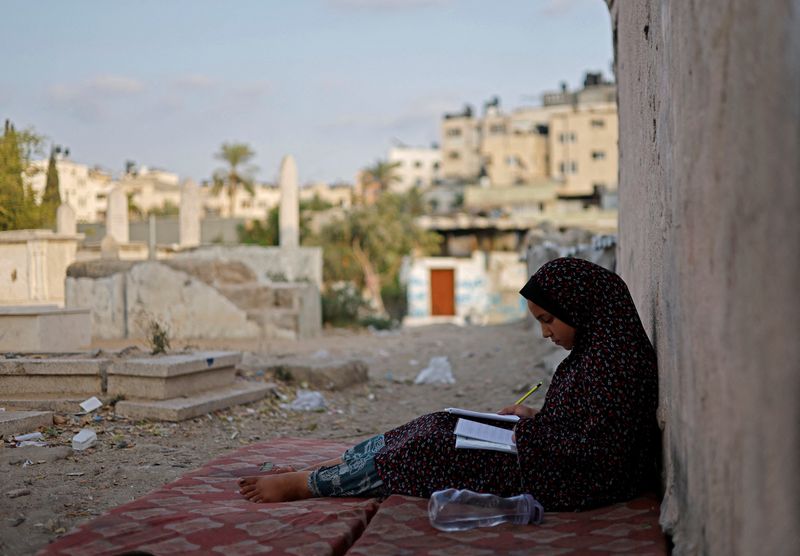By Nidal al-Mughrabi
GAZA (Reuters) - In the densely populated Gaza Strip, a battle for space is pitting the living against the dead as homeless squatters settle in the area's cemeteries while authorities grapple with the growing demand for new housing.
In the Sheikh Shaban cemetery, the area's oldest, Kamilia Kuhail's family live in a house built by her husband at the eastern edge of the site, covering the graves of two unknown people whose remains are now buried under the foundations.
"If the dead could talk, they would tell us, get out of here," said Kuhail who has lived in the cemetery in downtown Gaza for 13 years with her husband and a family now numbering six children.
Visitors have to climb down three steps to get into the sparsely furnished house where they encounter a strong smell Kuhail calls the "smell of death."
Her children, who earn small amounts bringing water to funeral ceremonies, keep asking their parents when they will be able to move away from the cemetery.
"I sometimes get invited by friends from school, but I can't invite them here, I am too shy to do that," said 12-year-old daughter, Lamis.
The pressure on space in the cemetery reflects the growing pressure on land in Gaza, a narrow patch between Egypt and Israel blockaded from both sides, which has faced a mounting demographic crisis for years. Its population is set to more than double within the next 30 years to 4.8 million and already land is running out.
Competition for scarce Gaza real estate is fierce, with ever rising demand both for housing and for farming land to help feed the growing population which needs 14,000 new housing units a year, according to deputy Housing Minister Naji Sarhan.
Even the dead are affected, their resting places pressured not just by squatters but by the relentless realities of a growing population with nowhere else to go.
"We face a dilemma finding land to build graves because of the reality of Gaza and its population growth," said Mazen An-Najar, of Gaza's Ministry of Waqf and Religious Affairs, which supervises 64 cemeteries in the enclave.
"The need gets bigger and bigger every year. We need construction and we need cemeteries and graves," he said.
COMPETITION
With so many competing demands, the need for more cemetery space has fallen down the list of priorities, especially given the repeated wars that have damaged thousands of housing units.
Already the Waqf ministry has closed down 24 cemeteries which had reached capacity though many families continue to bury their dead in the old graveyards close to their homes.
"It is prohibited to bury here and it is difficult to find a place but people don't listen," said Khaled Hejazi, a Waqf guard at Sheikh Radwan cemetery in Gaza.
"I try to stop them but I can't."

Najar said they have allocated new cemeteries in the other four cities of the territory, but must now immediately find a replacement for the largest cemetery located in northern Gaza city, home to around 750,000 people.
"It is about to be full, and maybe in three or four years we will not find land to use for burial," he said.